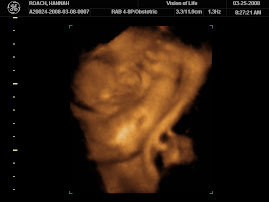I posted here earlier that my sister in law (Brian's sister and her husband) was expecting twins. For those that read my blog here is what is now taking place. Please keep Johnna and Edward in your thoughts and prayers.
I had my second ultra sound today 4/24/08 and we found out I am only having one baby. Baby A is doing really well with a heart beat of 182. Baby B however isn't growing and had no heart beat. I was told that it is a "Vanishing Twin." Edward and I are still excited and we hope that our family and friends are still just as excited. Please keep us in your thoughts and in your prayers.
Answers to frequently asked questions about Vanishing Twins
In recent years, enhanced use of ultrasound early in pregnancy has increased the frequency of diagnosis of twin pregnancy, and unfortunately, has produced a heightened awareness of the phenomenon of Vanishing Twin Syndrome
Here are the answers to Frequently Asked Questions about this condition.
What is Vanishing Twin Syndrome?
Vanishing Twin Syndrome occurs when one of a set of twin fetuses apparently disappears from the womb during pregnancy, usually resulting in a normal singleton pregnancy.
What really happens?
One of the fetuses in a twin pregnancy spontaneously aborts, usually during the first trimester; the fetal tissue is absorbed by the other twin, the placenta, or the mother, thus giving the appearance that the twin "vanished."
How is it diagnosed?
Here's a typical scenario: A mother undergoes a routine ultrasound early in her pregnancy, for example at six or seven weeks gestation. Two fetuses are detected. The mother is told she is having twins. When the mother returns to the doctor six weeks later, only one heartbeat can be heard with a Doppler scan. Another ultrasound is performed. Only one fetus is identified.
In other cases, a pregnant mother experiences symptoms that would seem to mimic miscarriage; however the single baby in her womb remains unaffected.
How often does it happen?
Scientists have confirmed that the number of twin conceptions greatly outnumbers the number of actual twin births. Some estimates offer that 1 in 8 people started life as a twin, while in reality only 1 in 70 actually are a twin. In "Having Twins," author Elizabeth Noble claims that 80% of twin pregnancies result in the loss of one or both babies. Other studies predict that Vanishing Twin Syndrome occurs in 21 - 30% of all multiple pregnancies in the United States. It is estimated that Vanishing Twin Syndrome will play a role in 50% of assisted ovulation pregnancies.
Why is it happening more frequently?
Although it would seem that incidences of Vanishing Twin Syndrome are increasing with alarming frequency, it is simply that the detection of the phenomenon has increased. Advancements in ultrasound technology allow modern doctors (and parents) the exciting opportunity to peek into the womb. As more doctors routinely use ultrasound in the first trimester, more multiple pregnancies are identified. And a certain percentage of those will be affected by Vanishing Twin Syndrome. In the past, many women experienced VTS without ever knowing it.
What causes it?
Just as there is no clear attributable cause for most miscarriages, there aren't always reasons or explanations for the loss of a fetus in a multiple pregnancy. In some cases, the fetus is in viable due to chromosomal or placental abnormalities. Some studies suggest that because these abnormalities are more common in older women, Vanishing Twin Syndrome occurs more often in mothers of advanced age. Vanishing Twin Syndrome occurs with equal frequency in mono zygotic and di zygotic twins, although the complications of sharing a placenta between monochorionic mono zygotic twins may contribute to the condition.
What are the symptoms?
There might not be any symptoms. However, some mothers experience some mild cramping, bleeding or pelvic discomfort, similar to miscarriage. Decreasing hormone levels may also indicate that one fetus has been reabsorbed.
What is the treatment?
Generally, neither the mother nor the remaining fetus will require any kind of medical treatment. When VTS occurs in the first trimester, the mother usually goes on to experience a normal pregnancy and delivers a healthy singleton. However, in situations where a fetus dies in the second or third trimester, the mother may experience pre-term labor, infection or hemorrhaging. In those cases, doctors will prescribe treatment appropriate for those conditions.
Subscribe to:
Post Comments (Atom)


.jpg)



No comments:
Post a Comment